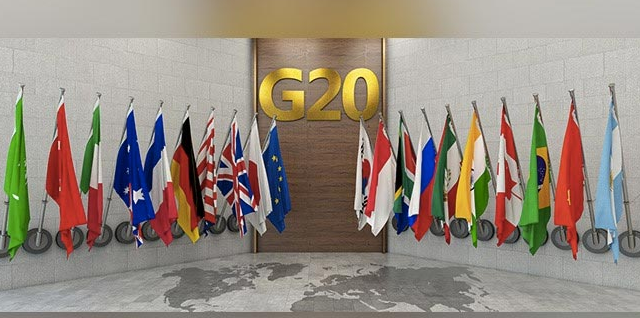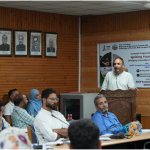The G20 (Group of 20) is an international forum consisting of 19 countries and the European Union, whose finance ministers and central bank governors meet regularly to discuss policy issues related to the global economy. The G20 countries represent 85% of the global GDP and two-thirds of the world’s population. The G20 was established in 1999 and its main goal is to promote international financial stability and facilitate international economic cooperation.
Theoretical background of G20 in Global politics
The theoretical background of organizations like the G20 in global politics is rooted in the concept of international governance and the need for cooperation among states to address global challenges. One of the key theoretical approaches in this area is the neoliberal institutionalist perspective, which emphasizes the role of international institutions and organizations in promoting cooperation and stability in the international system. According to this perspective, the creation of international institutions like the G20 can facilitate cooperation by providing a forum for states to negotiate and coordinate their policies, and by establishing rules and norms that constrain state behavior.
Historical background of G20
The G20 was established in response to the financial crisis that hit many countries in the late 1990s. The idea behind the formation of the G20 was to bring together leading economies from different regions of the world to discuss key issues related to the global economy and to coordinate efforts to tackle common challenges. The G20 started as a meeting of finance ministers and central bank governors, but it has since expanded to include a leaders’ summit and various other meetings of ministers and senior officials. The G20 has played a crucial role in responding to the global financial crisis of 2008-2009 and other challenges faced by the world economy. Over the years, the G20 has addressed a wide range of issues, including financial regulation, trade, investment, tax, and development, among others. The G20 is seen as an important mechanism for promoting global economic stability and growth, and for addressing global economic challenges that cannot be solved by any one country acting alone.
Main agenda of G20
The main agenda of the G20 is to promote international economic cooperation and to address global economic challenges. Some of the key issues that are typically discussed at G20 meetings include:
- Global economic growth: The G20 aims to promote sustainable and inclusive economic growth and job creation.
- Financial regulation: The G20 works to strengthen the financial system and reduce the risk of future financial crises.
- International trade: The G20 seeks to promote free and fair trade and to reduce trade barriers.
- Investment: The G20 aims to increase investment flows, particularly to developing countries.
- Taxation: The G20 works to improve the transparency of international tax systems and to address tax avoidance and evasion.
- Climate change: The G20 seeks to promote a transition to a low-carbon, climate-resilient economy.
- Development: The G20 works to support economic development and to reduce poverty, particularly in developing countries.
These are some of the main issues on the G20 agenda, but the focus of the meetings can vary from year to year, depending on the most pressing global economic challenges at the time
Challenges facing G20
The G20 faces several challenges in achieving its goals and fulfilling its role as a leading forum for international economic cooperation. Some of the key challenges facing the G20 include:
Lack of consensus: The G20 is made up of 19 countries and the European Union, each with their own national interests and priorities. This can make it difficult to reach consensus on important policy issues and to take effective collective action.
Unequal representation: Some argue that the G20 does not adequately represent the developing world, and that the interests of the poorest and most vulnerable countries are not adequately taken into account.
Limited enforcement power: The G20 operates on the basis of consensus, and its decisions are not legally binding. This means that member countries are not obligated to follow through on their commitments, and that the G20’s ability to effect real change is limited.
Slow pace of change: The G20 operates in a complex and rapidly changing global economic environment, and its processes can be slow and bureaucratic. This can make it difficult for the G20 to respond quickly and effectively to new challenges and opportunities.
Resistance to change: Some member countries may be resistant to making changes to their domestic policies, particularly if those changes are perceived to be against their national interests.
Despite these challenges, the G20 remains an important platform for international economic cooperation and coordination, and it continues to play a crucial role in addressing global economic challenges and promoting sustainable and inclusive economic growth. By working together and building consensus, the G20 member countries can overcome these challenges and continue to make a positive contribution to the global economy.
Indian’s role in G20
India is one of the 19 countries that are members of the G20. As a member of the G20, India has the opportunity to participate in discussions and negotiations on key global economic issues, and to help shape the global economic agenda. India has used its membership in the G20 to promote its economic and political interests, and to raise issues of concern to the country and its citizens.
India has been an active participant in G20 meetings, and has taken a leadership role in several areas, such as promoting inclusive growth, increasing investment in infrastructure, and strengthening financial regulation. India has also used its membership in the G20 to advocate for the interests of developing countries and to promote economic cooperation and integration between developed and developing countries.
In addition to its role as a member of the G20, India has also played host to a number of G20 meetings, including the G20 Leaders’ Summit in 2012, which was held in New Delhi. India’s hosting of this important event showcased the country’s growing global influence and its commitment to contributing to the G20’s work on global economic issues.
India’s presidency of G20
India is set to assume the presidency of the G20 in 2023. As the president of the G20, India will play a leadership role in setting the agenda for the G20 meetings and in coordinating the work of the other member countries. As the president of the G20, India will have the opportunity to showcase its economic and political priorities and to raise awareness of the challenges and opportunities facing the global economy. The presidency of the G20 is seen as an important platform for advancing India’s interests and for promoting the country’s profile on the global stage. India’s presidency of the G20 is expected to be an opportunity to further deepen its engagement with the other member countries and to enhance its role in shaping the global economic agenda. It is also expected to provide a platform for India to promote its vision for a more inclusive and sustainable global economy, and to contribute to the G20’s efforts to address the most pressing economic and development challenges facing the world.
In recognition of the significance of India’s assumption of the G20 Presidency, the event is celebrated through a range of official and unofficial activities, such as conferences, seminars, and public events. These activities are designed to promote understanding of the role of the G20 and the importance of India’s presidency, and to engage a broad range of stakeholders in discussions on key economic and development issues.
India’s G20 Presidency celebration; an emerging soft power
India’s celebration of its G20 Presidency can be seen as a demonstration of its emerging soft power, as it showcases the country’s growing influence and reputation on the global stage. By assuming the presidency of the G20, India has the opportunity to project its image as a responsible and influential global player, and to demonstrate its leadership and commitment to addressing key economic and development challenges facing the world. In this sense, India’s celebration of its G20 Presidency can be seen as a means of promoting its values and interests and of enhancing its reputation as a responsible and engaged global actor. Through a range of activities and events, India is able to demonstrate its commitment to multilateral cooperation and to building bridges between different countries and regions.
(The Author is Sr. Lecturer, Education Department. Email: [email protected])








